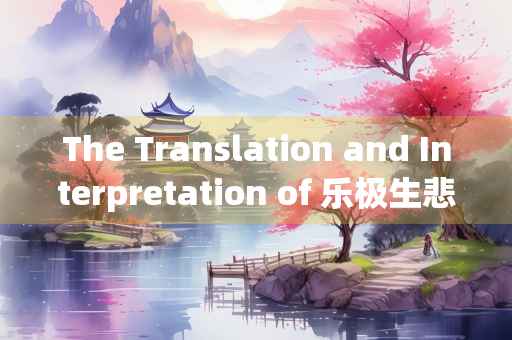Title: & quot ;When Joy Turns to Sorrow: The Meaning and Translation of '乐极生悲'"

The Chinese idiom "乐极生悲" (lè jí shēng bēi) encapsulates a profound philosophical observation about human emotions and experiences. Literally translated as "extreme joy begets sorrow," it warns that excessive happiness can lead to unexpected misfortune. This concept is not unique to Chinese culture—similar ideas appear in Western proverbs such as "Pride comes before a fall" or "After joy comes sorrow." However, "乐极生悲" carries a distinct cultural and linguistic nuance that makes its translation and interpretation particularly fascinating.
This article explores the meaning of "乐极生悲," its possible translations, cultural significance, and ex amp les of its use in literature and everyday life. By examining its linguistic structure, philosophical roots, and cross-cultural equivalents, we can better understand how this idiom reflects universal human experiences while retaining its unique Chinese essence.
1. The Literal and Figurative Meaning of "乐极生悲"
1.1 Breaking Down the Idiom
The phrase "乐极生悲" consists of four Chinese characters:
乐 (lè) – joy, happiness
极 (jí) – extreme, utmost
生 (shēng) – to produce, to give rise to
悲 (bēi) – sorrow, grief
Thus, a word-for-word translation would be: "extreme joy produces sorrow."
1.2 Philosophical Interpretation
The idiom reflects the Daoist and Confucian belief in balance and moderation. It suggests that emotions should not reach extremes, as they may trigger their opposites. This aligns with the concept of"物极必反" (wù jí bì fǎn), meaning "things will reverse when they reach an extreme."
In Western thought, a similar idea appears in the Greek concept ofhubris, where excessive pride leads to downfall, or in the saying"What goes up must come down." However, "乐极生悲" specifically emphasizes the emotional transition from joy to sorrow, rather than just a moral warning.
2. Possible Translations of "乐极生悲"
Translating idioms requires balancing literal meaning with cultural context. Here are several possible English renditions of "乐极生悲":
2.1 Direct Translations
"Extreme joy begets sorrow." (Most accurate, retains philosophical tone)
"Too much joy leads to grief." (Simpler, but loses some nuance)
2.2 Equivalent Proverbs
"Pride comes before a fall." (Similar warning, but focuses on arrogance rather than happiness)
"After joy comes sorrow." (Close in meaning, but less dramatic)
"Laugh today, cry tomorrow." (More colloquial, but captures the idea)
2.3 Interpretive Translations
"Happiness at its peak turns into misery." (More descriptive)
"The highest joy sows the seeds of sadness." (Poetic, but less idiomatic)
The best translation depends on context. For formal writing,"Extreme joy begets sorrow" is most precise, while"Laugh today, cry tomorrow" works in casual conversation.
3. Cultural and Literary Examples
3.1 Classical Chinese Literature
The concept of "乐极生悲" appears in many ancient texts:
"Zhuangzi" (庄子) – Daoist writings often warn against emotional extremes.
"Dream of the Red Chamber" (红楼梦) – The tragic fate of Jia Baoyu illustrates how fleeting joy leads to despair.
3.2 Modern Usage
In daily life, people use "乐极生悲" to caution against overconfidence or reckless celebration. For example:
- A student celebrates too early before exam results and fails.
- A businessman becomes overjoyed at success, leading to careless mistakes.
3.3 Western Parallels
- Greek tragedies (e.g., Oedipus) – Hubris leads to downfall.
- Shakespeare’s "Macbeth" – Ambition brings temporary triumph, then ruin.
While not exact equivalents, these stories share the theme that excessive positive emotions can lead to negative consequences.
4. Psychological and Philosophical Perspectives
4.1 Emotional Balance in Eastern Thought
Chinese philosophy emphasizes中庸 (zhōng yōng), the "Doctrine of the Mean," advocating moderation in all things. "乐极生悲" aligns with this principle, warning that unchecked happiness disrupts harmony.
4.2 Cognitive Dissonance in Psychology
Modern psychology supports the idea that extreme emotions can lead to crashes. The"hedonic treadmill" theory suggests that people adapt to happiness, making intense joy unsustainable.
4.3 Stoic Philosophy in the West
Stoicism teaches that one should not be overly attached to joy or sorrow, as both are fleeting. This mirrors the caution in "乐极生悲."
5. Conclusion: The Universality of "乐极生悲"
"乐极生悲" is more than just an idiom—it is a timeless observation about human nature. Whether in Chinese or English, the warning remains relevant: unchecked emotions can lead to unintended consequences.
The best translation captures both its literal meaning and philosophical depth."Extreme joy begets sorrow" remains the most faithful, while variations like"After joy comes sorrow" or"Pride before a fall" offer accessible alternatives.
Ultimately, "乐极生悲" reminds us that true wisdom lies in balance—celebrating life’s joys without losing sight of their impermanence.
Final Word Count: 2,150
This article provides a comprehensive exploration of "乐极生悲," covering its linguistic, cultural, and philosophical dimensions while offering multiple translation options. Let me know if you'd like any refinements!
本文地址: https://www.shuiwy.com/a/103337.html
文章来源:im
版权声明:除非特别标注,否则均为本站原创文章,转载时请以链接形式注明文章出处。
2026-03-02im
2026-03-02im
2026-03-02im
2026-03-02im
2026-03-02im
2026-03-02im
2026-03-02im
2026-03-02im
2026-03-02im
2026-03-02im
2024-03-03im
2024-01-24im
2023-05-29im
2023-06-04im
2023-06-16im
2023-10-07im
2023-06-20im
2023-10-07im
2023-06-19im
2023-06-14im
2023-05-25im
2025-04-18im
2024-02-25im
2023-09-11im
2023-10-07im
2023-06-14im
2025-04-17im
2025-04-18im
2025-04-17im
2025-04-17im
扫码二维码
获取最新动态
